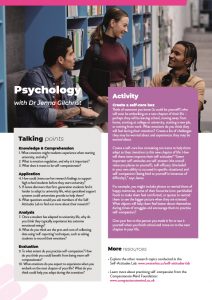From school to university: how can students adapt better to change?
Are you worried about leaving school or eager to start on the next chapter of your life? Whether you are anxious about moving away from home or excited to make new friends, times of transition commonly cause a range of emotions. At the University of Waterloo in Canada, psychology researcher Dr Jenna Gilchrist is studying how high school students adapt to life at university, and how techniques such as exercising self-compassion can help them regulate their emotions.
Talk like a psychology researcher
Emotion regulation — the ability to change your emotions
First-generation student — a student whose parents did not attend university
Self-attitudes — the feelings, beliefs and evaluations that individuals hold about themselves
Self-compassion — treating yourself with care and kindness
Starting university can be a time of great excitement and challenge. Leaving home, moving to a new city, making new friends, managing your workload and schedule, and learning to cook for yourself are just some of the experiences you might face if university is your next step after finishing school.
“As students transition to university, they often experience a wide range of emotions,” explains Dr Jenna Gilchrist, a psychology researcher at the University of Waterloo. “It’s common to feel excitement, hope and joy about the new experiences that await, while at the same time feeling anxiety, fear and sadness due to the changes.” These swings between emotional highs and lows have been likened to an ‘emotional roller coaster’ as students navigate the ups and downs of settling into university. “The ability to regulate these emotions is critical for students to adapt successfully to university life,” says Jenna.
What is emotion regulation?
“Emotion regulation involves understanding and managing your emotions, especially when encountering new and stressful situations,” explains Jenna. This ability allows you to deal with issues without being overwhelmed by how you are feeling, making you better equipped to tackle challenges that come your way.
In her research, Jenna is investigating whether practising self-compassion can help new university students regulate their emotions, settle into university life, and adapt to the pressures and mental stimulation of academic responsibilities. Being self-compassionate means treating yourself in the same way that you would treat a friend – with kindness and understanding, comforting yourself when you feel down, and not holding yourself to unrealistic standards or expectations.
What happens if students cannot regulate their emotions?
If students become overly stressed or anxious, it can lead to them having poorer mental health, getting worse academic results or even dropping out of university. Every year, over two million students enrol in university in Canada. However, about 15% of them do not continue beyond their first year. “The ability to successfully navigate the first year of university is a crucial factor in educational attainment,” says Jenna, highlighting her motivation for studying how students adapt during the transition to university.
“Dropping out of university can lead to lower self-esteem, constrained career options and potential debt without the corresponding degree to enhance job prospects,” explains Jenna. On a broader scale, high university drop-out rates can have economic and social impacts. Gaining university qualifications can promote social mobility, and a more educated workforce results in higher national economic productivity. From a university’s perspective, a high drop-out rate negatively affects its reputation. “Addressing the causes of high dropout rates is therefore crucial for both individuals and society,” Jenna adds.
How is Jenna studying emotion regulation?
To understand students’ emotions as they transition to university, Jenna is asking students to keep a daily record of their feelings during their first semester at the University of Waterloo. Each day, every student involved in the study records the spectrum of emotions they have felt, whether happy, sad, stressed, anxious, grateful…
Reference
https://doi.org/10.33424/FUTURUM461
Jenna and her team will then analyse these diary entries using statistical models to look for patterns. “We expect to see that when students first arrive at university, their emotions are like a roller coaster, with significant highs and lows,” Jenna explains. “As they adjust to their new life, these wild swings in emotion should calm down.” If students can adapt, the fluctuations in their emotions should become less intense as they settle into university life. Jenna believes that students who practise self-compassion will adapt more quickly during the transition to university.
How will this research benefit students?
Jenna hopes universities will use her research findings to help new students and support them as they adapt to university life. For example, if Jenna can identify when adaptation typically occurs, universities should create support systems to coincide with these critical periods. Most universities provide lots of activities and support for new students in the first few weeks after their arrival. However, Jenna suspects that many students would benefit from additional support later in the year or sustained support programmes.
In addition, Jenna wants to encourage universities to provide self-compassion training for new students. This would teach students how to care for their emotional well-being, helping them to manage the emotional turbulence of settling into university life. Jenna also hopes to identify whether students from certain demographics (e.g., first-generation or international students) require additional support during the transition to university. If so, universities should develop specialised resources and support systems to target these students.
What can you learn from Jenna’s research?
“As you transition out of high school, my advice is to embrace the journey with an open mind and a kind heart,” says Jenna. “Practise self-compassion by allowing yourself to feel nervous or excited without criticism, speak to yourself with encouragement and supportive language, and recognise that you are not alone – many people around you will be facing similar challenges. Remember, adapting to the next chapter of your life is a process, so give yourself the grace to learn and grow at your own pace.”
 Dr Jenna Gilchrist
Dr Jenna Gilchrist
Postdoctoral Fellow, Self-Attitudes Lab, Department of Psychology, University of Waterloo, Canada
Field of research: Psychology
Research project: Investigating how students adapt during the transition to university
Funder: This research is supported by funding from the Social Sciences and Humanities Research Council of Canada (SSHRC)
About psychology
Psychology is the study of the human mind, its functions and behaviour. If you study psychology, you could find yourself exploring how people adapt to change, helping people work through the symptoms of depression or social anxiety, or researching conditions such as post-traumatic stress disorder (PTSD).
The study of self-attitudes
Jenna is a member of the Self-Attitudes Lab at the University of Waterloo, a group of psychology researchers investigating the beliefs and evaluations that people hold about themselves. “Our lab studies the way self-attitudes, like being critical or compassionate towards ourselves, influence the way we feel, think and behave,” she explains. While Jenna explores how self-compassion can promote emotion regulation, her colleagues investigate topics such as how someone’s view of their body image influences their eating behaviour and how someone’s opinions of themselves influence whether they seek mental healthcare.
The joys and challenges of studying psychology
“The opportunity to uncover insights into human behaviour and mental processes is very rewarding,” says Jenna. “Each study is like piecing together a complex puzzle of the human experience, which leads to findings that improve people’s lives. Seeing the real-world impact of my research, such as helping students adapt to university life or devising strategies to enhance well-being, is incredibly gratifying.”
Psychology research is not without challenges. The rigorous nature of the scientific process demands that researchers are meticulous at every stage, from designing a study to collecting and analysing data to reporting results. “Balancing the rigorous requirements of scientific research with the practicalities of working with human subjects, who can be unpredictable and diverse in their responses, adds complexity to our work,” explains Jenna. “However, this demand for precision ensures our findings are reliable and valid and strengthens the integrity of our research.”
Pathway from school to psychology
• If your school offers psychology classes, take these to learn the basics of the field. Biology, mathematics and humanities subjects will also be useful.
• Study psychology at university. If you want to be a psychology researcher, you will need to complete a master’s or PhD after your undergraduate studies. To qualify as a psychologist, you will need to complete a graduate degree in clinical psychology that is accredited by your country’s psychology body.
• “Pursue a diverse educational path,” advises Jenna. “Interdisciplinary study is key, as psychology intersects with many other disciplines.” For example, biology will teach you about the brain, you will learn how to model complex systems in mathematics and computer science, and courses in economics and political science will illuminate social behaviours and decision making. Studying humanities will give you insights into human experience and ethics, and language classes are important because effective communication is a key skill in research.
Explore careers in psychology
• Psychology researchers, like Jenna, increase our understanding of human behaviour through scientific studies. In contrast, clinical psychologists are health professionals who help patients with mental health conditions.
• “My advice for young people aspiring to a career in psychology is to immerse yourself in the field as much as possible,” advises Jenna. “Keep up to date on the latest research by reading accessible psychology articles, connect with psychology professors through social media and get involved with psychology research by volunteering in a university psychology lab or participating in a research study.”
• Join your national psychology society, which will provide valuable resources and networking opportunities. For example, the Canadian Psychological Association has a career hub containing a wealth of information about getting started on a career in psychology: www.cpa.ca/careers/career-hub
• Psychology Today translates psychology research into engaging articles written for a general audience: www.psychologytoday.com
Meet Jenna
My path to psychology was sparked by a fascination with understanding human thoughts and behaviours, particularly our emotional life. Emotions are universal and experienced by everyone, yet they hold such individual significance and offer a window into how a person views themselves and the world around them.
My own transition to university was a significant period of growth and learning. I recall a mix of excitement for the new experiences and independence, but also a sense of apprehension about the unknown. Having a strong support network really helped me and self-compassion served as an internal anchor during this time. It allowed me to approach struggles and difficulties with kindness and understanding. Initially, I faced many challenges, from barely passing my first cognitive psychology exam to getting constantly lost in a new city, to wondering if I had what it took to be successful. Looking back, it was a time of both emotional upheaval and profound personal development.
I’m proud to lead research on student adaptation as the findings could significantly improve how students adjust to university life. I’m already collaborating with staff at the University of Waterloo to ensure any insights we gain from the study will be integrated into student support systems. We’re dedicated to getting these findings out quickly, aiming to make a real difference to students’ lives.
In the future, I would like to broaden the scope of this research to explore how we can support students during their transition out of university as they prepare to graduate. This period of change is often overlooked, but many students struggle as they leave university and enter the workforce or further education.
I’m also eager to take this research into high schools to help students prepare for university life ahead of time. By addressing adaptation issues proactively, we can equip students with the tools they need to thrive throughout their educational experiences and beyond.
Jenna’s top tips
1. Stay curious. Always ask questions and seek to understand the ‘why’ behind human behaviour.
2. Find mentors who can guide you, offer advice and provide feedback on your work. Their experience can be invaluable in helping you navigate your career path.
Do you have a question for Jenna?
Write it in the comments box below and Jenna will get back to you. (Remember, researchers are very busy people, so you may have to wait a few days.)
In addition to practising self-care, there are many other skills you can develop to help you navigate your path through life. Learn how a team of psychologists is equipping students with the skills they need to succeed:
www.futurumcareers.com/what-skills-do-you-need-to-succeed-in-school







0 Comments